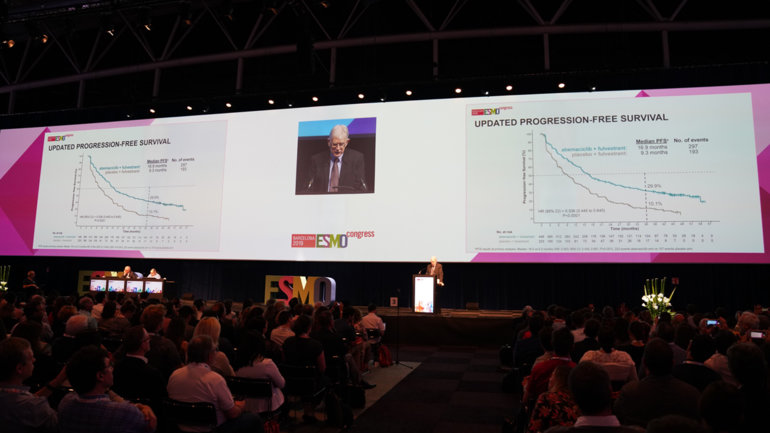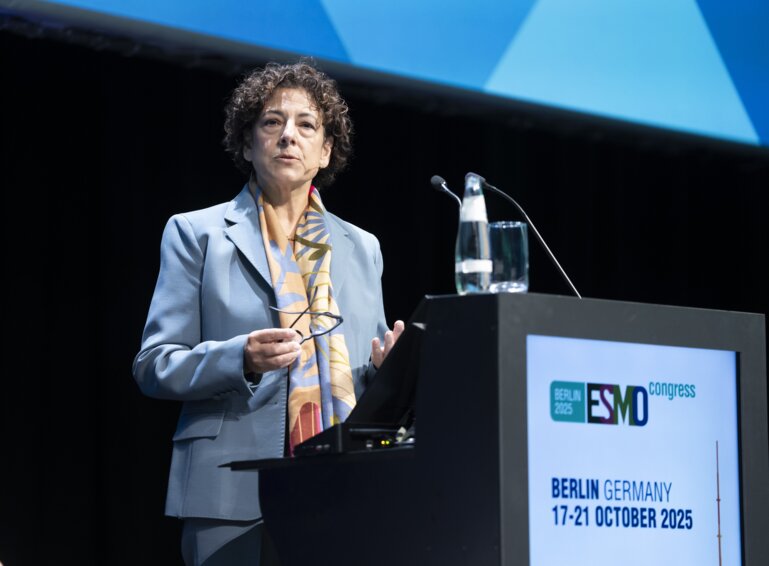Results from the MONARCH 2 and MONALEESA-3 trials
CDK 4/6 inhibitors in combination with endocrine therapy are confirmed to be beneficial in patients with hormone receptor (HR)-positive/HER2-negative metastatic breast cancer across the board, and no matter which agent is used, as results from two phase III trials presented yesterday at the Presidential Symposium showed.
Late-Breaking Abstract presentations from the MONARCH 2 trial with abemaciclib and the MONALEESA-3 trial with ribociclib demonstrated substantially improved overall survival (OS) in patients with HR-positive/HER2-negative metastatic breast cancer. Complementing similar positive data from the PALOMA-3 trial with palbociclib presented at ESMO 2018 and subsequently published, oncologists can now count on three CDK 4/6 inhibitors in this setting, although the choice of which agent to use and at which stage remains an open question. "When we look at statistics from tumour registries, median OS for HR-positive/HER2-negative metastatic breast cancer is still 2.5–3 years,” says Professor Nadia Harbeck, University of Munich (LMU), Germany, as she comments enthusiastically on the results. "Findings from these studies demonstrate that the combination of CDK 4/6 inhibitors plus endocrine therapy provides almost an extra 1.5 years of median life expectancy. We have reached the point where a lot of patients can achieve long-term stabilisation of their metastatic disease and this is fantastic news.”
Previous reports from the MONARCH 2 trial have shown that abemaciclib plus fulvestrant significantly improves progression-free survival compared with placebo plus fulvestrant in more than 650 pre- or post-menopausal women pretreated with endocrine therapy. Yesterday, an advantage in OS was demonstrated for the first time for this agent. Abemaciclib plus fulvestrant was shown to be associated with an OS benefit of 9.4 months – median OS was 46.7 months in patients treated with abemaciclib plus fulvestrant compared with 37.3 months in those who received placebo plus fulvestrant (hazard ratio [HR] 0.757; 95% confidence interval [CI] 0.606–0.945; p=0.0137) (Abstract LBA6_PR). No surprising safety signals were recorded with abemaciclib.OS data were also presented from the MONALEESA-3 trial comparing ribociclib plus fulvestrant versus placebo plus fulvestrant as first- or second-line treatment of 726 post-menopausal women with HR-positive/HER2-negative metastatic breast cancer (Abstract LBA7_PR). Ribociclib plus fulvestrant significantly prolonged OS versus placebo plus fulvestrant (median not reached [NR] versus 40.0 months; HR 0.724; 95% CI 0.568–0.924; p=0.00455). Notably, the OS benefit was observed in both the first-line setting (median NR versus 45.1 months; HR, 0.700; 95% CI 0.479–1.021) and in patients with early relapse or who were receiving second-line treatment (median 40.2 versus 32.5 months; HR 0.730; 95% CI 0.530–1.004). The safety profile of ribociclib was similar to previously published analyses.
"Taken together, these are remarkable and consistent findings,” says Harbeck. "With the results of MONARCH 2, we can now say that all three CDK 4/6 inhibitors – palbociclib, abemaciclib and ribociclib – in combination with endocrine therapy, provide a survival advantage compared with endocrine therapy alone. In addition, MONALEESA 3 has confirmed findings from MONALEESA 7, presented earlier this year, and demonstrated that the survival benefit is consistent in pre- and post-menopausal women, and occurs in the first- and second-line settings.”"CDK 4/6 inhibitors should be used as early as possible in the disease course based on the first-line results seen in MONALEESA 3 and the consistent overall survival benefit observed in the second-line setting in MONARCH 2, as presented here in Barcelona,” highlights Harbeck.
Given these noteworthy results, she believes that CDK 4/6 inhibitors will become part of the standard of care. But how to choose the right inhibitor and which is the optimal treatment sequencing? "There are subtle differences in the safety profiles and management requirements of these treatments. The choice of the most appropriate CDK 4/6 inhibitor should be based on individual patient characteristics and previous treatment but, in general, adverse events related to these agents are all manageable with the right training,” concludes Harbeck. "Not every patient will receive second-line treatment – some are too ill or do not want to receive more treatment – and we should not withhold these agents, such is their now proven clinically meaningful impact on survival. Multinational efforts are required to generate evidence, such as from the ESMO Magnitude of Clinical Benefit Scale, to determine the potential benefit of these agents in the first-line, real-life setting and aid their availability and reimbursement across Europe.”
ESMO Congress 2019 abstracts:
- LBA6_PR - MONARCH 2: Overall survival of abemaciclib plus fulvestrant in patients with HR+, HER2- advanced breast cancer
- LBA7_PR - Overall survival (OS) results of the phase III MONALEESA-3 trial of postmenopausal patients (pts) with hormone receptor-positive (HR+), human epidermal growth factor 2-negative (HER2−) advanced breast cancer (ABC) treated with fulvestrant (FUL) ± ribociclib (RIB)






